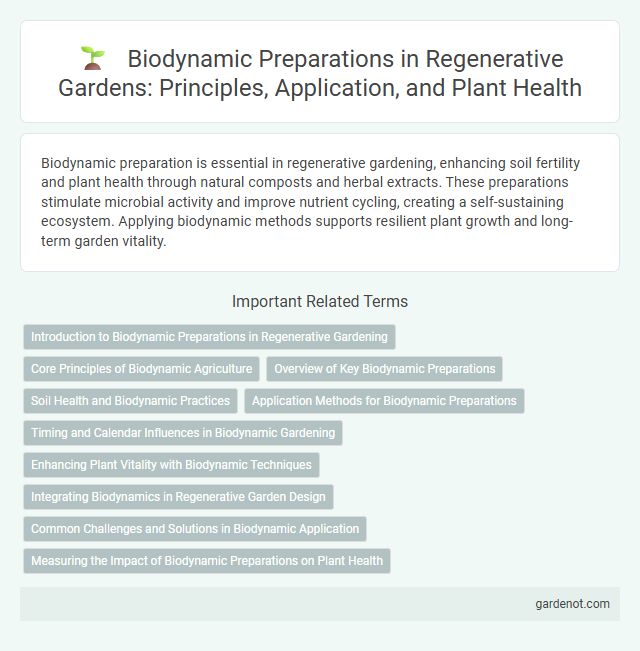Biodynamic preparation is essential in regenerative gardening, enhancing soil fertility and plant health through natural composts and herbal extracts. These preparations stimulate microbial activity and improve nutrient cycling, creating a self-sustaining ecosystem. Applying biodynamic methods supports resilient plant growth and long-term garden vitality.
Introduction to Biodynamic Preparations in Regenerative Gardening
Biodynamic preparations are essential in regenerative gardening for enhancing soil vitality and plant health through natural processes. These preparations, numbered 500 to 508, incorporate herbs, minerals, and animal manures to stimulate microbial activity and balance soil ecosystems. Applying these preparations supports nutrient cycling and fosters resilient, self-sustaining garden systems rooted in holistic agricultural principles.
Core Principles of Biodynamic Agriculture
Biodynamic preparation in regenerative gardens involves using herbal composts, fermented manure, and mineral additives to enhance soil vitality and stimulate plant growth. Core principles of biodynamic agriculture emphasize treating the farm as a self-sustaining organism, integrating crop rotation, biodiversity, and lunar cycles to optimize ecosystem balance. This holistic approach improves soil fertility, promotes microbial activity, and supports resilient plant health without synthetic chemicals.
Overview of Key Biodynamic Preparations
Biodynamic preparations are natural formulations used to enhance soil fertility and stimulate plant growth by harnessing cosmic and earthly forces. Key preparations include Horn Manure (Preparation 500), which enriches soil microbial life, and Horn Silica (Preparation 501), that improves photosynthesis and plant resilience. Other essential preparations, such as Compost Preparations 502 to 507, aid in compost decomposition and nutrient cycling, creating a balanced, self-sustaining regenerative garden ecosystem.
Soil Health and Biodynamic Practices
Biodynamic preparations, such as horn manure (Preparation 500) and silica (Preparation 501), play a crucial role in enhancing soil health by stimulating microbial activity and nutrient cycling. These practices improve soil structure, increase organic matter content, and promote balanced ecosystem dynamics within regenerative gardens. Emphasizing biodynamic methods supports resilient plant growth and sustainable soil fertility over time.
Application Methods for Biodynamic Preparations
Biodynamic preparations are applied through specific methods such as spraying diluted solutions onto compost or soil to stimulate microbial activity and enhance nutrient cycling. Horn manure (Preparation 500) is typically sprayed in the early morning or late evening in a fine mist to maximize energetic infusion into the soil. Field sprays of horn silica (Preparation 501) involve timing applications with sun movement for optimal light energy assimilation in plants.
Timing and Calendar Influences in Biodynamic Gardening
Biodynamic preparation in regenerative gardening relies heavily on the lunar and cosmic calendar to optimize planting and soil enrichment. Timing activities such as sowing, transplanting, and fertilizing according to moon phases and planetary influences enhances plant vitality and soil microbiome balance. This alignment with celestial rhythms promotes natural growth cycles and increases garden resilience.
Enhancing Plant Vitality with Biodynamic Techniques
Biodynamic preparation enhances plant vitality by stimulating soil microbiology and improving nutrient uptake, fostering robust root development and healthier foliage. These preparations, such as horn manure and compost teas, introduce beneficial microorganisms that balance the garden ecosystem and increase plant resilience to pests and diseases. Applying biodynamic techniques promotes sustainable growth cycles, resulting in more vibrant and productive regenerative gardens.
Integrating Biodynamics in Regenerative Garden Design
Biodynamic preparations enhance soil fertility and plant health by leveraging natural microbial activity and mineral balance, supporting regenerative garden ecosystems. Integrating biodynamics in regenerative garden design promotes holistic nutrient cycling and improves resilience against pests and diseases through carefully applied compost teas, herbal sprays, and field sprays. Effective use of these preparations aligns with ecological principles, encouraging biodiversity and sustainable garden productivity.
Common Challenges and Solutions in Biodynamic Application
Common challenges in biodynamic preparation include precise timing based on lunar cycles and the complexity of handling natural materials like cow manure and herbal extracts. Solutions involve adhering to detailed lunar calendars, using standardized preparation methods, and collaborating with experienced practitioners to ensure biodynamic preparations enhance soil vitality and plant health effectively. Consistent monitoring and adapting to local environmental conditions improve the success rate of biodynamic applications in regenerative gardens.
Measuring the Impact of Biodynamic Preparations on Plant Health
Measuring the impact of biodynamic preparations on plant health involves analyzing soil microbiome diversity, plant growth rates, and resistance to pests and diseases in regenerative gardens. Studies indicate that specific preparations, such as BD500 (horn manure) and BD501 (horn silica), significantly enhance nutrient uptake and stimulate beneficial microbial activity. Quantitative assessments using chlorophyll content, root biomass, and yield consistency provide critical data validating the effectiveness of these biodynamic inputs in promoting sustainable plant vitality.
Biodynamic preparation Infographic

 gardenot.com
gardenot.com